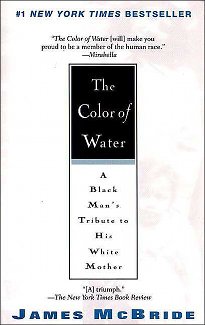The Color of Water
 |
|
| Author | James McBride |
|---|---|
| Cover artist | Honi Werner |
| Country | United States |
| Language | English |
| Genre | Memoir |
| Publisher | Penguin Group |
|
Publication date
|
1996 |
| Pages | 301 |
| ISBN | |
The Color of Water: A Black Man's Tribute to His White Mother, is the autobiography and memoir of James McBride first published in 1995; it is also a tribute to his mother. The chapters alternate between James McBride's descriptions of his early life and first-person accounts of his mother Ruth's life, mostly taking place before her son was born. McBride depicts the conflicting emotions that he endured as he struggled to discover who he truly was, as his mother narrates the hardships that she had to overcome as a white, Jewish woman who chose to marry a black man in 1942.
In The Color of Water author James McBride writes both his autobiography and a tribute to the life of his mother, Ruth McBride. Ruth married Andrew Dennis McBride, a black man from North Carolina. James' childhood was spent in a chaotic household of twelve children who had neither the time nor the outlet to ponder questions of race and identity. Ruth did not want to discuss the painful details of her early family life when her abusive father Tateh lorded over her sweet-tempered and meek mother Mameh. Ruth had cut all ties with her Jewish family.
After arriving in the United States when she was two years old, Ruth spent her early childhood traveling around the country with her family as her father sought employment as a rabbi. Tateh eventually gave up hope of making a living as a rabbi. He settled the family in Suffolk, Virginia, and opened a store in the mostly black section of town, where he overcharged his customers and expressed racist opinions. When Ruth was a child, Tateh sexually abused her and made harsh demands on her to work constantly in the family store. Tateh cheated on his wife, in an affair of which practically everyone in town was aware. Ruth's brother Sam left home at age fifteen, and soon after, Ruth too felt she must leave. She wanted to escape the oppressive environment of both her family and the South. She was also pregnant by Peter, her black boyfriend in Suffolk, and wanted to deal with the pregnancy away from her family. She took trips to New York to stay with relatives, and later moved permanently to Harlem. Ruth's family disowned her when she left, disgusted with her preference for marrying a black man instead of a Jewish man, her general failure to embrace Judaism, and her defiance of her father. Ruth promised her sister Dee-Dee that she would return to Suffolk, but she could not reconcile her family's desires for her life with her own desires for her life. She betrayed her promise to return for Dee-Dee, and her relationship with her sister suffered as a consequence. This separation from her family recurs throughout the memoir as a painful element in Ruth's life.
In Harlem, Ruth met Dennis, to whom she was immediately attracted. She married him, converted to Christianity, and became very involved with church activities. The couple experienced a certain degree of prejudice as a result of their interracial marriage. However, Ruth recalls these years of her life as her happiest ones. Dennis and Ruth opened the New Brown Memorial Church together in memory of Reverend Brown, their favorite preacher. They had several children, and eventually moved to accommodate their growing family. When Ruth became pregnant with Dennis's eighth child, James, Dennis fell ill with lung cancer, and died before James was born. Ruth mourned his death deeply and became desperate to find a means to support herself and her eight children. She approached her relatives for assistance, but they refused to have any sort of contact with her. Ruth met her second husband, Hunter Jordan, soon after. They married and eventually had four children together.
...
Wikipedia
